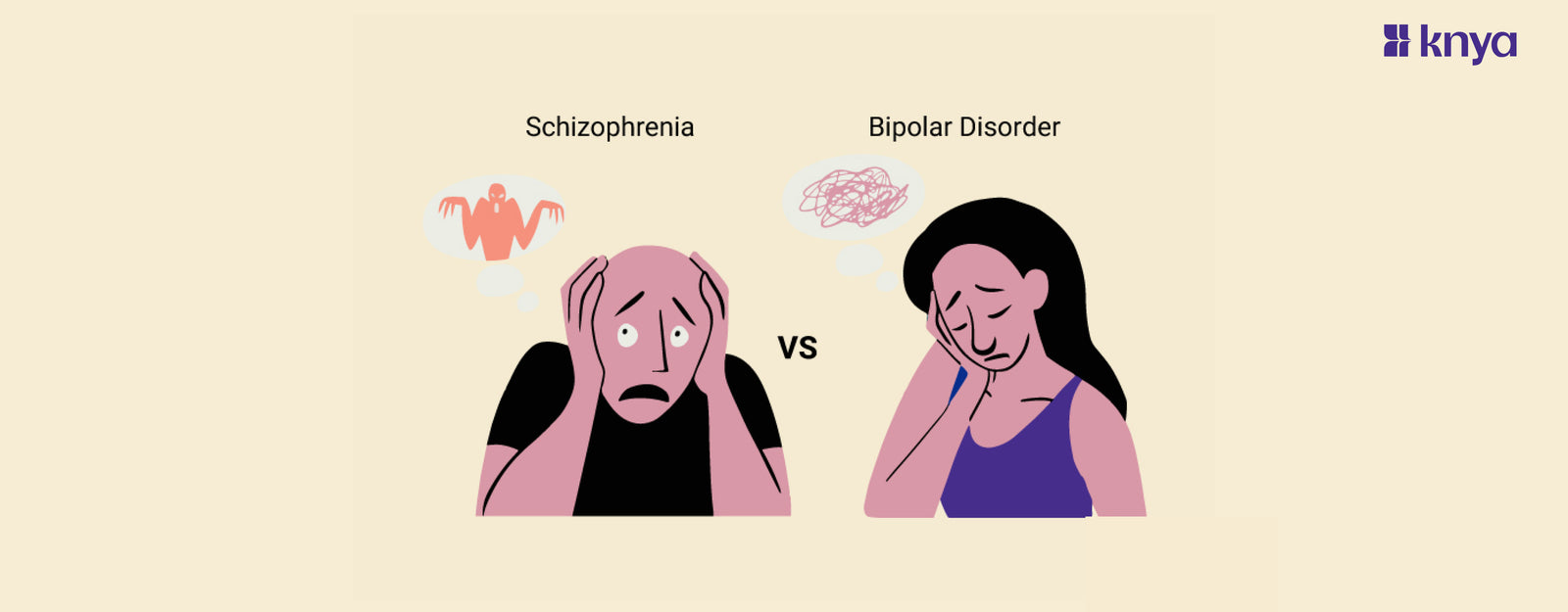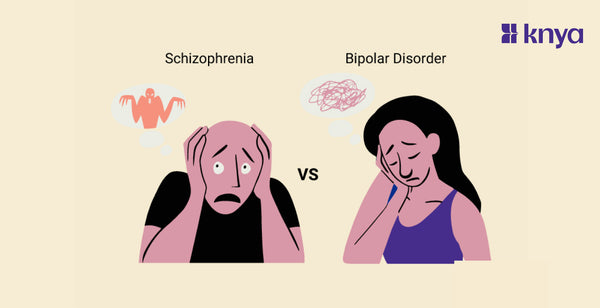Difference Between Schizophrenia and Bipolar Disorder: Schizophrenia and bipolar disorder are distinct mental health conditions, each characterized by unique symptomatology and diagnostic criteria. While they fall under the broader category of mood and psychotic disorders, their manifestations, underlying mechanisms, and treatment approaches differ significantly. Understanding the difference between them is crucial for accurate diagnosis and tailored therapeutic interventions.
Difference Between Schizophrenia and Bipolar Disorder
Here's a table outlining the key differences between Schizophrenia and Bipolar Disorder:
|
Feature |
Schizophrenia |
Bipolar Disorder |
|
Primary Symptoms |
Hallucinations, delusions, disorganized thinking, social and occupational impairments |
Mood episodes of mania/hypomania and depression |
|
Nature of Disorder |
Psychotic disorder characterized by disruptions in thought processes and perceptions |
Mood disorder is characterized by distinct manic and depressive episodes |
|
Onset Age |
Typically begins in late adolescence or early adulthood |
Onset often occurs in adolescence or early adulthood |
|
Course of Illness |
Chronic with episodic exacerbations and remissions |
Episodic with recurrent mood episodes |
|
Hallucinations and Delusions |
Common; individuals may experience auditory or visual hallucinations, and delusions |
Not typical during mood episodes; more associated with psychotic features during severe mania |
|
Mood Episodes |
Absence of distinct mood episodes; mood is generally stable |
Manic or hypomanic highs alternating with depressive lows |
|
Cognitive Impairment |
Common; deficits in memory, attention, and executive function |
Occasional cognitive deficits during severe mood episodes |
|
Social and Occupational Impact |
Substantial impairments in social and occupational functioning |
Impact on social and occupational functioning during mood episodes |
|
Treatment Approach |
Antipsychotic medications are often a primary component of treatment |
Mood stabilizers, antipsychotics, and antidepressants may be used depending on the phase of the disorder |
|
Prognosis |
Chronic condition with varying outcomes; requires long-term management |
Can be effectively managed with medication and psychotherapy; prognosis |
What is Schizophrenia?
Schizophrenia is a severe mental health disorder characterized by a range of cognitive, emotional, and behavioral symptoms. Individuals with schizophrenia often experience disruptions in thought processes, perceptions, and emotional regulation. The disorder can significantly impact a person's ability to function in daily life, affecting their relationships, work, and self-care.
Key features of schizophrenia include:
- Hallucinations: Perceptions of stimuli that are not present, commonly auditory hallucinations where individuals hear voices.
- Delusions: Strongly held false beliefs that are resistant to reason or contrary evidence.
- Disorganized Thinking: Difficulty organizing thoughts, leading to disjointed speech and communication.
- Impaired Social and Occupational Functioning: Individuals with schizophrenia often struggle with maintaining relationships and fulfilling daily responsibilities.
- Negative Symptoms: These include a reduction or absence of normal functioning, such as diminished emotional expression, social withdrawal, and a lack of motivation.
- Cognitive Impairment: Some individuals may experience difficulties with memory, attention, and executive functions.
- Onset: Symptoms typically emerge in late adolescence or early adulthood, but the onset can occur at any age.
- Chronic Course: Schizophrenia often follows a chronic and lifelong course with varying levels of symptom severity.
The exact cause of schizophrenia is not fully understood, but it is believed to involve a combination of genetic, biological, and environmental factors. Treatment typically involves a combination of antipsychotic medications, psychotherapy, and support services to help individuals manage symptoms and improve their quality of life. Early intervention and ongoing support are crucial for individuals with schizophrenia.
Symptoms of Schizophrenia
Schizophrenia is a complex mental health disorder characterized by a range of symptoms that can be categorized into three main groups: positive, negative, and cognitive symptoms. It's important to note that individuals with schizophrenia may experience symptoms differently, and the severity can vary. Here are the key symptoms associated with schizophrenia:
- Positive Symptoms:
- Hallucinations: Perceptions in the absence of external stimuli. Auditory hallucinations (hearing voices) are most common, but visual hallucinations can also occur.
- Delusions: Strongly held false beliefs that are resistant to reason or evidence. Examples include paranoid delusions (believing others are plotting against them) or delusions of grandiosity (believing in one's exceptional abilities).
- Thought Disorders: Disorganized thinking, reflected in speech and communication difficulties. This may include incoherent or tangential speech.
- Negative Symptoms:
- Reduced Emotional Expression: Limited facial expressions, monotone speech, and a lack of emotional responsiveness.
- Social Withdrawal: Difficulty establishing and maintaining relationships, preferring isolation.
- Anhedonia: Decreased ability to experience pleasure or interest in activities that were once enjoyable.
- Alogia: Reduced speech output, often manifesting as poverty of speech (limited verbal communication) or poverty of content (limited meaningful information in speech).
- Lack of Motivation: Difficulty initiating and sustaining purposeful activities.
- Cognitive Symptoms:
- Impaired Memory: Difficulty with memory recall and retention.
- Executive Dysfunction: Challenges in planning, organizing, and initiating tasks.
- Attention Deficits: Difficulty focusing and sustaining attention.
- Disorganized Symptoms:
- Disorganized Behavior: Unpredictable or inappropriate actions, such as unpredictable agitation or unpredictable hygiene habits.
- Impaired Insight: Many individuals with schizophrenia may lack insight into their condition, often not recognizing the severity of their symptoms.
It's important to note that not all individuals with schizophrenia will experience all of these symptoms, and their presentation can vary over time. Diagnosis and treatment are typically conducted by mental health professionals based on a comprehensive evaluation of symptoms and their impact on an individual's functioning. Early intervention and appropriate treatment can help manage symptoms and improve overall outcomes for individuals with schizophrenia.
What is Bipolar Disorder?
Bipolar disorder, also known as manic-depressive illness, is a mental health condition characterized by extreme and fluctuating mood swings. Individuals with bipolar disorder experience episodes of mania (or hypomania) and depression, which can significantly impact their daily life, relationships, and overall functioning.
Key features of bipolar disorder include:
- Manic Episodes:
- Elevated Mood: Periods of intense and elevated mood, characterized by heightened energy levels, euphoria, and increased self-esteem.
- Increased Activity: Engaging in activities at a frenetic pace, sometimes with poor judgment and risk-taking behavior.
- Reduced Need for Sleep: Feeling rested with minimal sleep, often accompanied by increased energy.
- Hypomanic Episodes:
- Hypomania is a milder form of mania, characterized by similar but less severe symptoms. Individuals experiencing hypomanic episodes may still function relatively well in their daily lives.
- Depressive Episodes:
- Low Mood: Periods of persistent and profound sadness, hopelessness, and a lack of interest or pleasure in activities.
- Fatigue: Feeling tired, lacking energy, and experiencing changes in sleep and appetite.
- Difficulty Concentrating: Challenges in focusing and making decisions.
- Suicidal Thoughts: In severe cases, individuals may experience suicidal ideation.
- Cyclical Nature: Bipolar disorder is characterized by recurrent episodes of mania, hypomania, and depression. The frequency and intensity of these episodes can vary among individuals.
- Bipolar I vs. Bipolar II:
- Bipolar I disorder involves manic episodes that can be severe and may require hospitalization. Depressive episodes are also part of the cycle.
- Bipolar II disorder involves hypomanic episodes and depressive episodes but not full-blown mania.
- Rapid Cycling: Some individuals with bipolar disorder experience rapid cycling, defined as four or more mood episodes within 12 months.
The exact cause of bipolar disorder is not fully understood, but genetic, biological, and environmental factors are believed to contribute. Diagnosis and treatment typically involve mental health professionals who assess symptoms, medical history, and overall functioning. Treatment may include mood stabilizers, antipsychotic medications, psychotherapy, and support from healthcare providers and loved ones. With proper management, individuals with bipolar disorder can lead fulfilling and stable lives.
Symptoms of Bipolar Disorder
Bipolar disorder is characterized by distinct episodes of mania, hypomania, and depression. The symptoms can vary in intensity and duration. Here are the key symptoms associated with each phase of bipolar disorder:
- Manic Episode Symptoms:
- Elevated Mood: A sustained period of abnormally high or irritable mood.
- Increased Energy: Heightened energy levels and a feeling of restlessness.
- Decreased Need for Sleep: A reduced need for sleep without experiencing fatigue.
- Grandiosity: An exaggerated sense of self-esteem or importance.
- Racing Thoughts: Rapid and often disorganized thinking.
- Increased Talkativeness: Speaking more rapidly and impulsively.
- Impulsive Behavior: Engaging in risky behaviors, such as reckless spending, substance abuse, or risky sexual encounters.
- Distractibility: Easily distracted and difficulty focusing on tasks.
- Hypomanic Episode Symptoms:
- Hypomania is a milder form of mania with similar but less severe symptoms.
- Individuals with hypomania may still function relatively well in daily activities.
- Depressive Episode Symptoms:
- Low Mood: Persistent feelings of sadness, hopelessness, or emptiness.
- Fatigue: Decreased energy levels and increased feelings of tiredness.
- Sleep Disturbances: Changes in sleep patterns, including insomnia or hypersomnia.
- Changes in Appetite: Significant changes in appetite and weight.
- Difficulty Concentrating: Challenges in focusing, making decisions, and remembering things.
- Loss of Interest: Decreased interest or pleasure in activities once enjoyed.
- Feelings of Guilt or Worthlessness: Persistent negative self-perceptions.
- Suicidal Thoughts: In severe cases, individuals may experience thoughts of death or suicide.
- Mixed Features:
- Some individuals may experience symptoms of both mania/hypomania and depression simultaneously or in rapid succession.
- Cyclothymic Disorder:
- A milder form of bipolar disorder characterized by chronic mood disturbances, with periods of hypomania and depressive symptoms lasting for at least two years.
It's essential to note that the presentation of symptoms can vary among individuals, and the severity and frequency of mood episodes can differ. Diagnosis and treatment are typically conducted by mental health professionals based on a comprehensive evaluation of symptoms, medical history, and overall functioning. Early intervention and appropriate treatment can help manage symptoms and improve overall outcomes for individuals with bipolar disorder. If you or someone you know is experiencing symptoms of bipolar disorder, seeking professional help is crucial for accurate diagnosis and effective management.
Similarity Between Schizophrenia and Bipolar Disorder
While schizophrenia and bipolar disorder are distinct mental health conditions with their unique characteristics, there are some similarities and overlaps in certain aspects. Here are a few similarities between schizophrenia and bipolar disorder:
- Genetic Factors:
- Both disorders have a genetic component, meaning that individuals with a family history of either schizophrenia or bipolar disorder may have an increased risk of developing the condition.
- Neurobiological Factors:
- Both conditions are associated with abnormalities in neurotransmitter systems, particularly dopamine, serotonin, and glutamate.
- Onset Age:
- The typical onset for both schizophrenia and bipolar disorder often occurs in late adolescence or early adulthood. However, they can emerge at different life stages.
- Impaired Cognitive Functioning:
- Both disorders can be associated with cognitive impairments, though the specific nature and extent of these impairments can vary. For example, difficulties in memory and attention may be present in both schizophrenia and bipolar disorder.
- Psychotic Symptoms:
- While psychotic symptoms are a hallmark of schizophrenia (e.g., hallucinations and delusions), they can also occur during severe manic or depressive episodes in bipolar disorder. Psychotic features in bipolar disorder are more prevalent during manic episodes.
- Treatment Approaches:
- Antipsychotic medications are used in the treatment of both schizophrenia and bipolar disorder. While they are a primary treatment for managing psychosis in schizophrenia, they are also prescribed during manic or mixed episodes in bipolar disorder.
- Impact on Daily Functioning:
- Both conditions can significantly impact an individual's daily functioning, relationships, and overall quality of life. Social and occupational impairments may be observed in individuals with schizophrenia or bipolar disorder.
- Chronicity:
- Both disorders often follow a chronic course with recurring episodes, requiring ongoing management and treatment.
It's crucial to recognize that while there are similarities, the core features of these disorders remain distinct. The presence of psychotic symptoms, the nature of mood episodes, and the overall clinical presentation are key factors that differentiate schizophrenia from bipolar disorder. Proper diagnosis by mental health professionals is essential to guide appropriate treatment strategies tailored to each condition.
|
Check out More Articles |
|
















